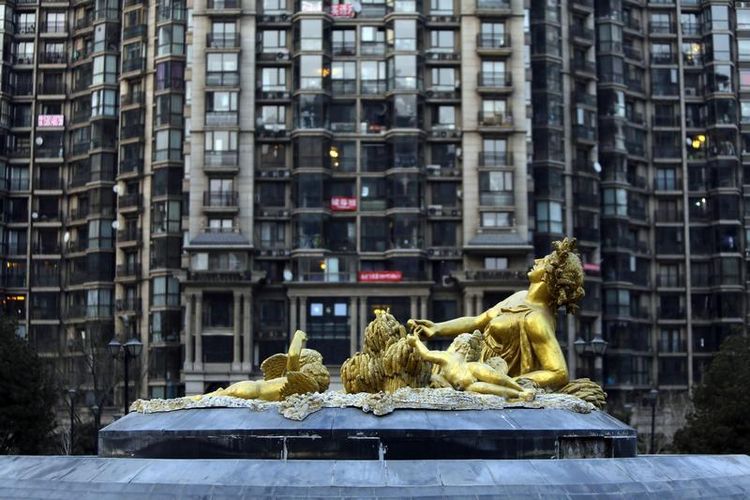The most liquid dollar bonds of leading property companies sank as much as one and half points yesterday following news that Zhejiang Xingrun Real Estate, a provincial developer, is unable to repay its bank debt.
The move underscored the heightened headline risk of dollar-denominated high-yield bonds from China after the first onshore bond default, from solar cell maker Chaori, two weeks ago. “It is sobering,” said a portfolio manager.
“We are expecting more negative headlines from the sector in the near-term as we get clean March monthly contract sales data from each company,” said a credit analyst in Singapore. As a result, he said, his shop is a short-term bear.
In the past two years, Chinese developers have issued US$40bn in foreign currency bonds, the result of a combination of onshore lending restrictions and low US dollar interest rates.
The China property sector now accounts for some 40% of Asia’s two biggest high-yield debt benchmarks, the Merrill Lynch and the JP Morgan Asian Credit indices.
With so many bonds outstanding from the sector and the recent news of the first default by an onshore bond issuer, foreign investors have become extra cautious.
That effect is likely to be felt as more defaults are reported. Analysts warn that smaller developers, in particular, are under pressure.
“We see polarization of performances between smaller players and bigger developers. We expect many more defaults from smaller developers,” said Bei Fu, an S&P analyst on Chinese real estate market.
The main risk is limited funding channels for smaller players. “Big banks have a list of approved clients which usually don’t include small developers; small lenders are volatile themselves; and trust loan availability will be limited after two high-profile defaults earlier this year,” she added.
Another analyst noted that there could be more coming from the province where Xingrun is based. “Zhejiang is pretty rife with shadow banking and trust financing,” he noted. “It isn’t the first time a developer there faced default issues - Greentown back in 2008 is the best example of a Zhejiang based developer which encountered liquidity issues.”
Greentown China ultimately overcame its issues thanks to Hong Kong Blue Chip Wharf Holdings, which bought a 24.6% stake in the company, an equity injection that not only helped it stay afloat but boosted its credit rating from a Triple-C level. It is now rated B2 by Moody’s and BB- by Standard & Poor’s.
Short-term bears
In spite of the bond market sell-off, most investors took the news in their stride. “[I’m] not sure how a Rmb3.5bn default by one small onshore developer means that some of the bigger developers are about to default,” said a hedge fund manager.
Equity investors, in fact, completely ignored the headline. The share price of Greentown rose on Monday, while KWG Property Holdings, which reported better than expected earnings, saw its stock soar 9.97%.
KWG’s dollar bonds due 2019, however, ended yesterday 25 cents weaker in price terms, still better than Evergrande’s 2018 bonds, which finished one and a half points down. “It was bottom-up in the bond universe,” noted the analyst.
In spite of the short-term dismal prospects, though, bond investors are hardly ready to jump out of the Chinese property sector altogether. “Obviously [the headlines are] not good, but I think investors don’t amalgamate,” said a senior DCM banker in Singapore.
Indeed, most investors contacted by IFR seemed to be more worried about the earnings season for Chinese developers than the fact that a small private company in a secondary region of the country had missed its loan payments.
An analyst in China had an even more pragmatic view. He said he was not surprised about the default and added that non-performing loans from Chinese developers have been on the rise lately.
He also said that Zhejiang is probably one of the provinces where prices have dropped the most, especially in the city of Wenzhou, where there seems to have been a lot of speculation around beachfront property.
He concluded that accounts receivables of the company had been on the rise and its turnover had slowed, so, put simply, it did not get paid in time to pay back lenders.
In short, the fundamental issues of Chinese developers remain the same and are unlikely to detract global investors from buying their bonds any more than they did before. But since the onshore bond default, investors have suddenly become more sensitive to headlines.
Which means that, for now, the sector is a good play only for those who can stomach volatility. “The world is still pretty nervous - which is partially correct as liquidity and sales are definitely slower,” said the hedge fund manager.
“I therefore think we go lower [in price terms] on a lack of buyers before getting to mid-year and realizing that they [Chinese developers that issue global bonds] are all – hopefully - still standing.”
